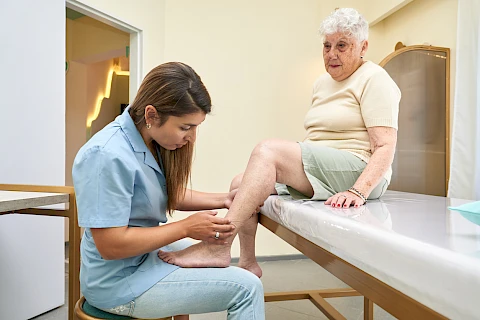
Diabetic neuropathy is a common yet serious complication of diabetes. As caregivers, understanding this condition is crucial in providing the best care for our loved ones. Awareness can make a significant difference in the quality of life for seniors living with diabetes. Being informed about diabetic neuropathy is essential for addressing the needs of the senior community, as Senior Helpers North Central Indiana will outline.
What is Diabetic Neuropathy?
Diabetic neuropathy is a type of nerve damage that occurs in people with diabetes. High blood sugar levels, over time, can injure nerves throughout the body, but the most common form affects the legs and feet.
This nerve damage can lead to pain, numbness, and even foot problems, making mobility difficult for seniors. Understanding how diabetes affects nerve health is the first step in managing this condition effectively.
Risk Factors for Seniors and Recognizing Symptoms
Several factors increase the risk of developing diabetic neuropathy in seniors. As we age, our body’s ability to repair nerve damage decreases. The longer a person has diabetes, the greater their risk of developing neuropathy. Other health conditions, like high blood pressure and obesity, can also contribute to nerve damage. Being aware of these risk factors can help caregivers take preventive steps early on.
Common symptoms in seniors include tingling, burning sensations, or numbness in the hands and feet. Some may experience sharp pains or cramps, while others notice muscle weakness. Act quickly if these symptoms appear. Consulting with a healthcare provider can prevent further damage and complications. Early intervention is key.
The Importance of Regular Foot Exams
Regular foot exams are vital in detecting diabetic neuropathy early. These exams help identify any changes or injuries senior might not feel due to nerve damage. Conducting a basic foot check involves looking for cuts, blisters, or abnormalities. Encouraging seniors to have regular professional check-ups is equally important, as healthcare providers can offer comprehensive assessments and advice.
Managing Neuropathy Symptoms
Managing symptoms of diabetic neuropathy involves making lifestyle adjustments. Encouraging seniors to maintain a balanced diet and regular exercise can alleviate symptoms. Exercise helps manage blood sugar, improve circulation, and support nerve health.
Stress management techniques like yoga or meditation can help relieve symptoms. These methods promote overall well-being, making everyday life more manageable. Seniors should always consult a doctor before starting a new fitness routine.
Preventing Complications
Preventing complications from diabetic neuropathy is a vital part of caregiving. Maintaining good foot health is important; seniors should wear comfortable shoes and avoid walking barefoot. Keeping blood sugar levels in check helps prevent further nerve damage. Medications and therapy prescribed by healthcare professionals can aid in managing symptoms and slowing the progression of the condition.
Senior Helpers Provides Diabetes Support Services
Understanding diabetic neuropathy and its impact on seniors is essential for effective caregiving. By recognizing risk factors and symptoms early, conducting regular foot exams, and making lifestyle adjustments, caregivers can significantly improve the lives of seniors. Proactive care is essential and can help prevent complications for better health outcomes.
If you need assistance in managing diabetic neuropathy for a loved one, contact us at Senior Helpers North Central Indiana. We offer senior care and support in Grant, Huntington, Kosciusko, Marshall, and Whitley counties. Let us help you provide the best care for your loved ones.